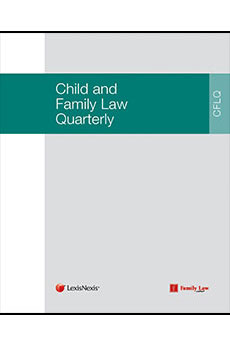- News & Comment
-
Online Shop
Online Services
Looseleafs
Law Reports
Books and eBooks
-
CPD & Events
Webinars
Events
- Authors
- About Family Law
- Contact


Dr Claire Fitzpatrick, Lancaster University
 The full version of this article will appear in Child and Family Law Quarterly, Vol 32, No 2.
The full version of this article will appear in Child and Family Law Quarterly, Vol 32, No 2.
Find out more or request a free 1-week trial of Child and Family Law Quarterly. Please quote: 100482.
This article charts new ground by exploring the important increase in awareness surrounding the care–crime connection in recent years. The over-representation of care experienced individuals in criminal justice settings has long been taken for granted. However, there has been a recent surge of interest in England and Wales in the need to avoid unnecessarily criminalising looked after children, and to support those with care experience in prison. Paradoxically, this increased awareness has occurred at the same time as a climate of crisis has threatened both the care system’s and the prison system’s capacity to function effectively. Despite the current climate, this article argues that things can be done to challenge the care–crime connection. Such strategies include: changing our language, connecting distinct policy priorities and moving beyond the limits of the law. Furthermore, the development of a life-course perspective could significantly improve understanding of the impact of care experience over time. This article concludes by arguing that in the current climate, continued diversionary push-back from the youth justice system is vital. Crucially, this could help further reduce the number of first time entrants in the justice system, and ultimately offer the best prospects for reducing the number of children who move between care and custody.
This article has been accepted for publication in Child and Family Law Quarterly in Issue 2, Vol 32, Year 2020. The final published version of this article will be published and made publicly available here 24 months after its publication date, under a CC-BY-NC licence.






